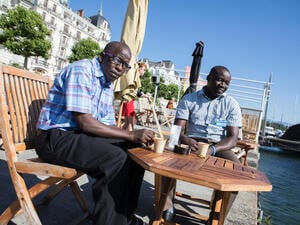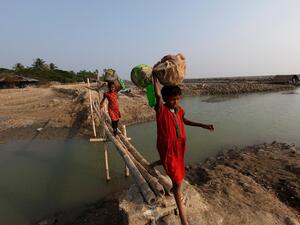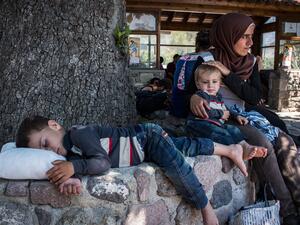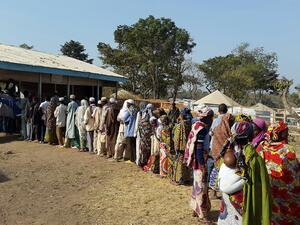Q&A: Afghan mountaineer reaches for the Himalayan skies
Q&A: Afghan mountaineer reaches for the Himalayan skies

Nadjib Sirat at the summit of Mont Blanc. The former Afghan refugee now has Mount Everest in his sights.
PARIS, France, March 3 (UNHCR) - Nadjib Sirat fled from Afghanistan in 1998 when he was 18 and settled in France, where he was recognized as a refugee and later became a French citizen. Today, he is involved in different mountaineering projects with French adventurer Charles Hedrich. Their aim is to use climbing to present an alternative and positive view of Afghanistan. To this end, they will try to scale the 8,201-metre-high Mount Cho Oyu in May, followed by an attempt on the world's highest peak, Mount Everest, in September. Sirat, who in 2008 became the first Afghan to climb Western Europe's highest peak, Mont Blanc, will be carrying the UNHCR logo on his anorak. He is also trying to raise interest in Afghanistan about skiing and mountaineering. He spoke recently in Paris to UNHCR Intern Hannane Boulmaoui. Excerpts from the interview:
Tell us how you ended up in France
In 1997, I started to work with Afrane [Amitié Franco-Afghane], a French NGO that specialized in the humanitarian and education sectors . . . This got me into trouble with the Taliban government, not only because I was working with foreigners but also because Afrane was helping girls get access to education. That is why I fled to Pakistan, where Afrane's head of mission helped me obtain a student visa to go to France.
When I arrived in France in October 1998, I spent three years in high school and then started studying to become a dental technician. At the same time, I attended evening classes to obtain a bachelors' degree in economics and management . . . I became a French citizen in 2009.
What were your early years in France like?
My first year was very difficult. I mixed almost exclusively with French students and I didn't integrate into the Afghan community. I opened up to French culture to the point where I briefly stopped thinking about Afghanistan and forgot about the concerns that connected me to my country.
To become financially self-sufficient, I chose to claim asylum after arriving in France on a student visa. This allowed me to work 20 hours per week. It gives me comfort to know that I have not been a financial burden to the country that received me; I have always worked and paid my taxes.
What made you become interested once more in Afghanistan?
In the beginning, I cut the connection with my country as I was too busy with my life as a student. But things changed when I obtained refugee status. That's when I started to take more interest in Afghanistan. I had a lot of different projects in mind on how to maintain my ties with Afghanistan. One idea was to open up a dental clinic or go back to work for an NGO. Then, of course, I also kept in close touch with my parents, my brothers and sisters in Afghanistan.
When I wanted to flee the country, my father did not accept it . . . As I was still young, he feared that I was going to be manipulated. My father has since passed away, but during my time as a student, knowing that I was leading a settled life, he was happy for me.
Tell us about your partnership with Charles Hedrich
A year ago, Charles Hedrich contacted the Afghan Embassy in Paris in his search for a young sports lover who was up to the challenge of becoming the first Afghan to climb [the 8,848-metre-high] Mount Everest. I accepted because I believed this project could present a positive image of Afghanistan and make it possible to speak about the country in a different way. Mountaineering was a way of showing that there is something beyond war . . . including beautiful mountains and sports. I want to catch the attention of young Afghans who watch skiing on television and dream about leaving their country. I want to show them that the snow and the mountains are right there, in Afghanistan, and that they too can have access to sports.
Mountaineering could also make people aware of the need to clear landmines from the high mountains in Afghanistan. Furthermore, sports could help to promote peace.
What message do you have for Afghans seeking asylum in Europe?
When I first arrived in France, I realized how difficult it was to be a foreigner. I understood that I will always be an Afghan and that even if France is my country, so is Afghanistan. I hope that, one day, Afghanistan will become a country where Afghans who once fled will want to return, and a country that others would like to visit.









